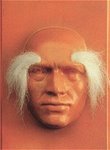I was attacked in bed
at 3am. It was unexpected, vicious and there were no witnesses.
The previous evening a
friend had related an anecdote in which a colleague displayed a cool
head in testing circumstances. When my friend said, “You stay very
calm”, he responded “I do.....but I have a big fucking mortgage.
And the other guy's a bell-end”
I have been described
as having a “relaxed attitude to life.” That fact is, I don't.
I'm just aware that there is a time and place to call someone a
“bell-end”. Moreover, as I recently learned in a dog-grooming
parlour, some self-censorship is necessary: banging on about
arthritis does not make the listener want to shag you.
However, in the
aftermath of my recent attack I felt like spewing out “bell-end”
at everyone and saw the social value in describing pain. I felt like
I had earned the right to bore the shit out of people. The pain made
me feel like taking a coping saw to my big toe and working until I
was blinded with bone dust. I was attacked by gout and I have
discovered that it is “one of the best Antidotes against Stoical
Opinions.”
There are those who
argue that pain is the route to self-improvement. In 1777, after
being hit by a runaway horse, the philanthropist John Brown wrote:
"Do me good, oh God! By this painful affliction may I see the
great uncertainty of health ease and comfort that all my Springs are
in Thee."
There may be something
in that. I certainly think that finding yourself in extreme pain can
award you profound insight into the state of your relationship. I can
also add that gout was literally my wake up call to take a long hard
look in the mirrored door of the bathroom medical cabinet and ask
myself “WHERE THE FUCKING HELL ARE THE PAINKILLERS?”
It took me half an hour
to discover the house was a pill-free zone. The attack rendered me
incapable of walking. I was reduced to crawling around my bedroom
like an inchworm. I had carpet burns on my chin. The stairs? Fuck
you, no: I'm not sharing that experience. Perhaps when we get to know
each other better. Or you get gout.
I've yet to see a
non-sufferer look sympathetic when you tell him that you have attacks
of gout. I, too, was guilty of mockery. I would have delighted at the
idea of a TV-show called “Bouts of Gout”,in which two sufferers
are put in a pebbled arena and zombie-shuffle towards each other
before going toe-to-toe.
The winner? Treat him
to a soothing swing in a hammock and cover him with Labrador puppies.
The loser? Send out a nicotine-starved stage-chimpanzee armed with a
rubber dildo. Have him knuckle-dash towards the terror-stricken
contestant. Watch, awe-struck, as he pounds the loser's toe with
simian zest. Listen to the pan-hoot drown out the howls of pain.
Applaud the naked ape. Buy the branded dildo. Accessorise it with
sweetcorn.
The misfortunes of
others are often borne with equanimity. Larkin put it brilliantly:
“Yours is the harder
course I see; on the other hand, mine is happing to me.”
In the case of gout,
the depth of the amusement is, partly, the legacy of class anxiety.
If we delve back in history, to a time when the medical profession
was still performing trepanning and other surgeries without
anaesthetic, we find plenty of petite-bourgeoisie that were ecstatic
when they could proclaim “I have gout”.
Folklore deemed gout a
disease of the “better sort, a superiority tax, a celebrity
complaint “fit for a man of quality.” Gout was the “distemper
of a gentleman” whereas the rheumatism was the distemper of a
hackney coachman.”
To say you had gout was
to imply that you could afford an extravagant lifestyle and you
hobbled through the corridors of power. It gained such an association
with the indulgence of alcohol and rich rood that, now, if you tell
someone you suffer from gout, they are likely to assume that you are
a person of congenital idleness, rancid morals and general
worthlessness.
It is true that you are
more likely to have an attack if you are over forty, male, a
heavy-drinker, overweight and idle. I'm two of those things, the ones
that I can't address. (Technically, I could change one of the two but
I don't fancy that assignment.) I don't have a six-pack but I'm not
overweight. I drink, but not that heavily. I idle, but it's
not, to my knowledge, a sobriquet.
Gout can just hit you
if you have a build up of uric acid and it causes the kind of pain
that, if I were of a certain age, might make me consider assisted
death. (Given attitudes to gout, I would probably end up using
“Indignitas” and find myself gently trundling down a cliff on a
wheeled commode whilst watching my lover perform a “Look Ma, no
hands!” sex act on her lover, all to the tune of “My Way.” )
Eighteen hours after
the start of the attack, I had to call 111. The surges of pain made
me my think my foot was going to explode and I was enfeebled to an
extent that I couldn't perform my inchworm manoeuvre. I was
prescribed painkillers and colchicine, a drug that gets rid of the
uric acid but dumps you with diarrhoea before you have regained the
ability to haul-ass at a functional rate. Yes, fuck you again, that
is another anecdote involving stairs I'm not sharing.
Seven days later, I
could stand. It made me want to dance. I couldn't, of course, but
after a week in which I had sacrificed a social trip to London, a
chance to meet friends whom I had not seen for many months and
everyone's casual mobility provoked a desire to shout insults,
unassisted standing nearly made me want to kiss “bell-ends.”





